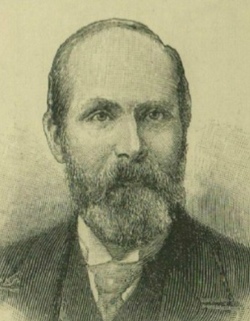William Minto (1845-1893)

William Minto (1845-1893) was Regius Professor of Logic at the University of Aberdeen in succession to Alexander Bain.
Minto was born on 10 October 1845 at Nether Auchintoul, near Alford, Aberdeenshire, the son of James Minto, farmer, and his wife, Barbara Copland. As a child he was educated at various village and private schools, including the Gordon Schools, Huntly. He gained a bursary and entered the newly united University of Aberdeen in 1861. He achieved great academic success, uniquely taking honours in three departments -- classics, mathematics, and philosophy -- andgraduating MA in 1865. He attended Aberdeen’s Divinity Hall in 1865-6 before going to Merton College, Oxford as an exhibitioner, where he stayed for only one year and left without taking a degree.
Minto returned to Aberdeen and briefly became assistant to the professor of natural philosophy (physics), before being appointed assistant to Alexander Bain, the professor of Logic and under whom he had studied and whose Chair carried the responsibility of teaching English literature. He served as Bain’s assistant from 1867 to 1873 and during this periodprepared his Manual of English Prose Literature, Biographical and Critical, an exhaustive and systematic work that waspublished in 1872.
In 1873 Minto, like Bain before him, moved to London and to journalism. He contributed literary and political articles to The Examiner, which he edited between 1874 and 1878. Subsequently he was a leader-writer on the Daily News, writingable and pungent criticisms of Disraeli's imperial policy (allegedly giving currency to the word jingoism). In 1874 he published Characteristics of English Poets from Chaucer to Shirley, and in 1879 a monograph on Defoe for the English Men of Letters series. He wrote a number of articles on literary subjects for the EncyclopaediaBritannica.
In 1880 on the retirement of Bain, Minto was elected to the Regius Chair of Logic and English in Aberdeen University, a post he held until his death. Though Logic and Rhetoric had long been combined in a single Chair at the Scottish universities, Minto’s occupancy of the Chair was marked by a much great emphasis on the study and teaching of literature than logic. He edited Walter Scott's Lay of the Last Minstrel (1886) and Lady of the Lake (1891), Scott's poetical works (1887), and Autobiographical Notes of the Life of William Bell Scott (1892. He also wrote three novels -- The Crack of Doom (1886), The Mediation of Ralph Hardelot (1888), and Was she good or bad? (1889).
Minto's health began to decline in 1891, and he died aged 47 on March 1st 1893 in Aberdeen, just as the separation of Logic from English in his dual chair offered the possibility of concentrating on his preferred subject. His university extension manual, Logic Inductive and Deductive, together with Plain Principles of Prose Composition were both published in 1893, and a third volume, English Literature under the Georges in 1894.
Minto’s career mirrored Bain’s to a remarkable degree, but nothing in his intellectual accomplishments and influence quite matches Bain’s important contribution to the development of scientific psychology.
Post-Enlightenment Philosophers
- Lady Mary Shepherd (1777-1847)
- Thomas Brown (1778-1820)
- Sir William Hamilton (1788-1856)
- Thomas Carlyle (1795-1881)
- James Frederick Ferrier (1808-1884)
- Alexander Bain (1818-1903)
- Alexander Campbell Fraser (1819-1914)
- James Hutcheson Stirling (1820-1909)
- John Veitch (1829-1894)
- Henry Calderwood (1830-1897)
- Edward Caird (1835-1908)
- Robert Flint (1838-1910)
- William Minto (1845-1893)
- Sir Henry Jones (1852-1922)
- David George Ritchie (1853-1903)
- Andrew Seth Pringle Pattison (1856-1931)
- James Seth (1860-1925)
- Robert Latta (1865-1932)
- Norman Kemp Smith (1872-1958)
- Archibald Allan Bowman (1883-1936)
- John Macmurray (1891-1976)
- C A Campbell (1897-1974)
- David Daiches Raphael (1916-2015)
- George Elder Davie (?)